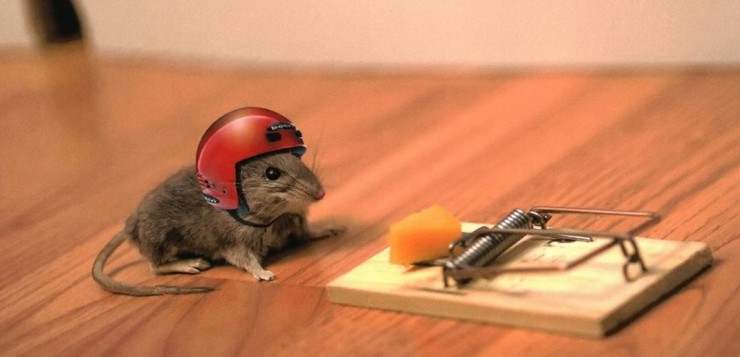Today I will share with you 5 common traps people tend to fall into during their fitness journeys. They have been experienced by everyone, from aspiring bodybuilders to new moms wanting to lose “post-pregnancy” weight.
I have personally fallen into each trap at least once, and I’m guessing there are a few that may look familiar to you…
1. Letting a “bad moment” spiral out of control…
Let’s use a food-related example. Imagine you’re having a “hungry” day, and you find yourself eating everything in sight (we’ve all been there 🙂 ). Before you know it, you’ve downed an entire bag of chips, devoured yesterday’s leftovers and polished off that chocolate bar. If you’re trying to lose weight or are following a specific diet, you may feel pretty bad after this experience…
“How could I have let myself sabotage my progress?”
“Where was my self control when I needed it?”
“I’ll never reach my goals!”
When situations like this occur, it is easy to blow what happened out of proportion, causing unnecessary and detrimental consequences.
Ideally, however, after slipping up you should try not to:
- Tell yourself that you might as well eat whatever you want for the rest of the day
You know the saying: “if you fall off a horse, get right back on”? If you break a good habit, try to reestablish it as soon as possible. The longer you wait, the more difficult it will be to do so, and before you know it one bad day could turn into a bad week…which could then turn into a bad month and so on.
- Hate and/or punish yourself
If the voices in your head start saying “you suck”, “you are pathetic,” or even “you will never accomplish anything,” do your best to ignore them. When it comes to achieving your goals, you are your own biggest ally. If you don’t have your own back, you risk constantly getting in the way of yourself. So, practice replacing the hate talk with positive affirmations such as: “you can do better than this, now prove it” or even the cliche but accurate “everybody makes mistakes.”
- “Fix” what happened
If you try to “fix” the situation by eating less the next day or running an extra three hours on the treadmill, you are only creating a vicious cycle, for if you fast or overexercise, chances are you will binge again later. Even if this doesn’t happen, by feeding the mentality that you can “fix” any slip-up, you are subconsciously giving yourself permission to let that mistake happen over and over again, which could eventually create a bad habit.
- Dwell on what happened
It’s only natural to feel regretful after messing up. If a few days later you are still upset, however, try to take a step back and reevaluate the situation. Remember that whatever happened is but a tiny bump in the road- a road you will be following for the rest of your life. Maybe you tripped and fell, but you still have legs to get back up and keep moving forward.
So, what should you do if you make a mistake or break a good habit? Well, as mentioned, try to reestablish the good habit right away. Forgive yourself, and then try to figure out what went wrong. In other words, what made you act in the way that you did? Stay objective here, and be honest with yourself. For the food-related example I used, maybe you didn’t eat enough the day before, or maybe you simply ate out of boredom.
If you want, you can write your thoughts down. The goal here is to take what happened as a learning experience, one you can grow from.
Once you have done this, do your best to let it go, even if this may be difficult to do at first.
“Forget failure, forget mistakes, forget everything but what you’re going to do now”
2. Constantly changing eating and exercise routines
Let’s take “Laura” as an example. Laura has decided that she wants to lose twenty pounds and get stronger. She has heard from many people that a good way to do so would be to start strength training, and eat a bit less than before. So, she googles “weight lifting plan for beginners” and finds a routine that seems doable. She also decides to stop going back for seconds at the dinner table.
Two weeks later, Laura gets an email advertising a new exercise and diet plan that “guarantees” results. After checking out the before and after pictures of people who have “followed the plan,” she buys and starts following it herself.
Ten days later, Laura’s good friend Susan calls, and tells her about her new personal trainer. Laura decides to see him, and yet again changes her routine.
A year later, Laura has hardly any results to speak of. Instead, she has a bookshelf full of diet plans, 47 different training routines bookmarked in her internet browser, and the cost of 5 personal trainers on her bank statement. 
With the massive flux of information out there today, particularly online, Laura’s experience is not at all uncommon; people have a hard time sticking to a plan. It seems that every time they have decided on one thing, they come across a website claiming that something else works better.
The problem with this is that if you don’t stick to a routine, you will never know whether it works for you or not, because you didn’t try it long enough for results to show!
Of course it’s tempting to buy the latest exercise plan when people around you are saying it’s the ‘best thing ever’. But remember, there are thousands upon thousands of plans, diets, and routines out there, and with more coming out every day there will always be “something better.”
If you don’t want to waste your time, find a routine that you can stick to, and follow it for at least 6 weeks. After this time span, you will be able to assess whether or not it is working for you. If it is, stick with it. If not, try something new.
3. Trying to avoid gaining fat while putting on muscle
Today, more and more people are realizing the benefits of increasing one’s muscle mass- more strength, a faster metabolism, a more aesthetic look…
As we previously mentioned in this article, putting on lean muscle mass is simply impossible. No matter what anyone may tell you, to build muscle, it is almost always a necessity to eat a surplus of calories. Your body needs that energy to function and to create new muscle tissue- a process that requires a lot of energy. The “good news” is, if you eat this surplus, you will put on muscle. The “bad news” is, you can’t ‘tell’ your body what calories to use towards building muscle, and what to store as fat.
 Although a balanced diet and well-planned training routine can limit the amount of fat gained, there is no way you can “just put on muscle.” That’s why many professional bodybuilders or physique competitors have an “off season” where they eat a surplus of calories and focus solely on gaining muscle, and a “competition prep season” where they eat at a deficit and focus solely on losing fat. They never try to do both at once.
Although a balanced diet and well-planned training routine can limit the amount of fat gained, there is no way you can “just put on muscle.” That’s why many professional bodybuilders or physique competitors have an “off season” where they eat a surplus of calories and focus solely on gaining muscle, and a “competition prep season” where they eat at a deficit and focus solely on losing fat. They never try to do both at once.
Often, a person wanting to get more muscle will eat at a surplus for a while, then freak out when they start noticing their six pack disappearing or pants getting tighter. They then cut back on calories and get the six pack back, but without any added volume…Basically, they are back to square one.
Don’t be afraid of a little fat! If you are careful, being a little chunkier for a few months will be well-worth the muscle mass you will gain. If your goal is to put on muscle, then you need to tear down any psychological barriers you have around gaining fat. The fat can always come off later.
4. Getting overly “obsessed”
For those who are truly passionate about their health, sport, or anything really, being labeled as “obsessed” is nothing new. There is, however, a fine line between passion and true obsession, which can negatively impact the other aspects of your life.
To find out whether or not you have possibly crossed this line, answer the following questions as honestly as possible:
- Do you find yourself feeling badly when you don’t/aren’t able to follow your usual routine?
This is probably the biggest indicator that you have “crossed the line”. If you feel prolonged anxiety, anger or stress after doing something you normally wouldn’t, this is a sign that your routine has become overly rigid.
Be objective here; feeling annoyed that working overtime has killed your plans to go jogging is not the same as staying up at night worrying about possible decreases in your mile time. Feeling regretful about eating an entire pie in one sitting is not the same as turning down dinner parties in fear of eating too much.

- Do you isolate yourself from others who do not follow the same lifestyle as you? (In other words, feel too “different” to connect with those who don’t share your passion or way of life.)
It’s wonderful to surround yourself with like-minded people, however becoming closed-minded and shutting people out because you feel they “don’t understand,” or because you feel superior to them is a red flag. Once again, be objective. If certain individuals are not being supportive of your goals and are bringing negativity into your life, it’s natural to want to distance yourself (although you should only do so after talking to them about their behavior).
- Do you find yourself neglecting other priorities in your life?
There is nothing wrong with devoting a lot of time into your passion, and sacrificing certain things for it (for example, giving up your weekly stint to the movies to save up for better running shoes). If you are obsessed, however, you may be sacrificing too much, and this without realizing. In order to find out if this is the case, you can make a list of your priorities.
Now check out this list and ask yourself, “am I realistically staying true its ordering?” For example, being there for your loved ones is probably near the top of the list. If you are spending your weekends at the gym rather than with your family, or neglecting your friends because you are “too busy” to hang out, are you really respecting this placement?
- Have your loved ones repeatedly expressed concern?
If you have made changes in your life, your loved ones will almost always react. Listen to what they have to say objectively (yes, that word again).
If many of your family members and friends approach you, saying they are worried about an aspect of your life, make sure you judge their opinion in a fair way. Try and find out what is motivating their reaction. It is possible that they simply do not understand your choices, or are not used to the changes you have made.
Rather than getting annoyed, feeling attacked, and/or getting defensive, be as calm and understanding as possible, and talk out their concerns. This can be very difficult to do, but once you master the skill it could save you from a lot of useless fighting and misunderstandings.
If even after this, your loved ones are still expressing concern, then you may want to take a second look at what they are saying…. Maybe your mother’s fear you have gotten ”too skinny” is because she still sees you as her plump little baby, or maybe it’s because you look unhealthy.
5. Expecting immediate results
In our highly capitalistic world, we are conditioned to believe that efficiency and rapidity is what’s best; that results must appear quickly and through as little effort as possible. So, machines do everything for us, workers are fired if they work too slowly, fast food restaurants are popping up like weeds, etc.
Many people make positive changes to their lifestyles, then get discouraged when they don’t look or feel different after a short while. Efficiency and rapidity may work for some aspects of life, but will rarely work concerning your health.
For example, it is not physically possible for your body to transform itself overnight. Or in a week or two either, for that matter. I don’t care what magic pill you found, what miracle “cookie-diet” you are going to start, or what cayenne pepper detox you heard about- there are no short cuts; unless you go under the knife, only hard work and perseverance will allow you to change. This means you must be willing to put in time and effort.
In other words, be patient; if you want it bad enough, in time you will achieve anything you set your mind to.
 A good way to harvest this patience is to focus on the journey and not the destination. Many of us decide to change our lifestyles in the hopes of obtaining something: abs, a smaller number on the scale, a “thigh-gap” (what has this world come to…).
A good way to harvest this patience is to focus on the journey and not the destination. Many of us decide to change our lifestyles in the hopes of obtaining something: abs, a smaller number on the scale, a “thigh-gap” (what has this world come to…).
Ideally, however, we will realize that more importantly than getting these tangible results is the process itself- the growth we will experience, things we will learn about ourselves and our bodies, and of course, the mistakes we will make. These things combined will help us evolve into healthier and more conscientious people.
By focusing on our own personal journeys, every day becomes just as important as the last, freeing us of our impatience.
“Every day is a journey, and the journey itself is home”-Matsuo Basho







Discussion1 Comment
Great article Victoria! 🙂